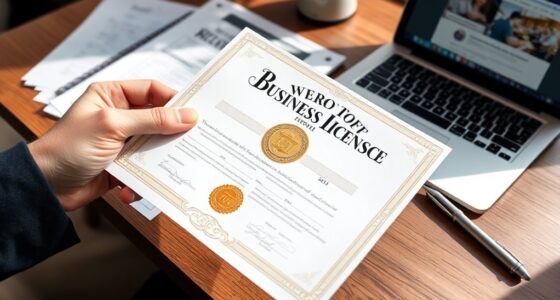To draft NDAs for business partnerships, clearly define what information is confidential, using precise language to avoid loopholes. Make certain to address legal requirements in your jurisdiction and specify the duration of confidentiality. Include exceptions for disclosures that are permitted, like legal obligations or public information. Focus on clarity and consult legal professionals if needed to strengthen enforceability. If you want to guarantee your agreement fully protects your interests, you’ll find valuable tips ahead.
Key Takeaways
- Clearly define confidential information, including trade secrets, client lists, and proprietary processes.
- Ensure the NDA complies with applicable local laws and is enforceable in your jurisdiction.
- Specify permitted disclosures and include exceptions for public information or legal requirements.
- Use plain language, avoid ambiguity, and consider legal review to strengthen clarity and enforceability.
- Outline confidentiality duration, post-termination obligations, and procedures for handling confidential data.

When forming a business partnership, drafting a clear and thorough Non-Disclosure Agreement (NDA) is essential to protect sensitive information. This document ensures both parties understand what information must remain confidential and how it should be handled. One of the key components you need to focus on is the confidentiality clauses. These clauses specify exactly what information is considered confidential, whether it’s trade secrets, client lists, proprietary processes, or financial data. You want to be precise here; vague language can lead to misunderstandings or loopholes that weaken your protections. Clearly defining the scope of confidentiality helps prevent future disputes and sets expectations from the start.
Legal considerations are equally critical when drafting your NDA. You need to ensure it complies with applicable laws and is enforceable in your jurisdiction. This means understanding the legal standards for confidentiality agreements in your area—some regions require specific language or disclosures to make the NDA valid. Additionally, consider the duration of the confidentiality obligation; some information needs protection indefinitely, while other data may only be sensitive for a limited time. Be mindful of enforceability issues, such as reasonableness in scope and duration, to prevent your NDA from being challenged in court.
Ensure your NDA complies with local laws and remains enforceable by considering scope, duration, and legal standards.
As you craft your confidentiality clauses, think about including exceptions to confidentiality. For example, if information becomes publicly available through no fault of your partner, or if disclosure is required by law, these exceptions clarify what isn’t protected. Adding a section on permitted disclosures and the process for handling them can prevent misunderstandings later. Also, specify the obligations of each party regarding the handling and return of confidential information once the partnership ends or the NDA is terminated. This helps ensure both sides know their responsibilities in safeguarding your data.
Drafting your NDA with legal considerations in mind means paying attention to enforceability and clarity. Use plain language, avoid ambiguous terms, and consider consulting a legal professional to review your agreement. This not only protects your interests but also demonstrates your commitment to confidentiality, fostering trust between partners. Remember, a well-drafted NDA isn’t just about protecting data—it’s about establishing a solid foundation of trust and clarity that supports your business relationship long-term. By carefully addressing confidentiality clauses and legal considerations upfront, you set the stage for a transparent, protected partnership that minimizes risks and misunderstandings.
Frequently Asked Questions
How Long Should an NDA Last in a Business Partnership?
When deciding how long an NDA should last in a business partnership, consider your specific needs and potential risks. Typically, NDAs have time limits ranging from one to five years, but you can include renewal clauses if you want the agreement to extend automatically. Think about the sensitivity of the information and your future plans, and tailor the duration accordingly to protect your interests effectively.
Can NDAS Be Customized for Different Types of Confidential Information?
They say “one size doesn’t fit all,” and that’s true for NDAs. You can customize NDAs with tailored clauses to suit different types of confidential information. Incorporate industry-specific terms to make the agreement clearer and more effective. By doing so, you safeguard sensitive data better and ensure the NDA aligns with your unique business needs, helping you avoid misunderstandings and legal issues down the road.
What Are Common Mistakes to Avoid When Drafting NDAS?
When drafting NDAs, you should avoid common mistakes like vague confidentiality clauses that leave room for interpretation. Make certain your confidentiality clauses clearly define what information is protected. Watch out for legal pitfalls, such as overly broad or unenforceable terms that can weaken your agreement. Always tailor the NDA to your specific needs and consult legal counsel to ensure your document is thorough and enforceable.
Are Verbal NDAS Legally Binding in Business Agreements?
Think of verbal agreements as fragile glass—easy to shatter under scrutiny. While verbal NDAs can be legally binding, they’re often like a whisper in a storm, hard to prove. Rely on written documentation for clarity and enforceability. Without it, your verbal agreement risks being dismissed in court, leaving your confidential information unprotected. Always put critical agreements into writing to ensure your business interests stay solid and secure.
How Enforceable Are NDAS Across Different Jurisdictions?
You’re wondering about NDA enforceability across jurisdictions. Jurisdictional variations critically impact how enforceable an NDA is, as different regions have unique legal standards. You might face enforceability challenges if the NDA isn’t compliant with local laws or if it’s too vague. To guarantee your NDA holds up, tailor it to each jurisdiction’s legal requirements and seek legal advice, so you minimize risks and strengthen enforceability worldwide.
Conclusion
Now that you know how to draft NDAs for your business partnership, remember that clarity and specificity are your best allies—think of it as your modern-day torch in the dark. Don’t leave room for the wild west of ambiguity; instead, be as precise as a knight’s sword. With these tips, you’ll be well-equipped to protect your secrets and forge strong alliances—just like the legendary partnerships of yore, but with a legal shield instead of chainmail.









